AWM41 1043 - [Nurses Narratives] Sister Leila G Smith
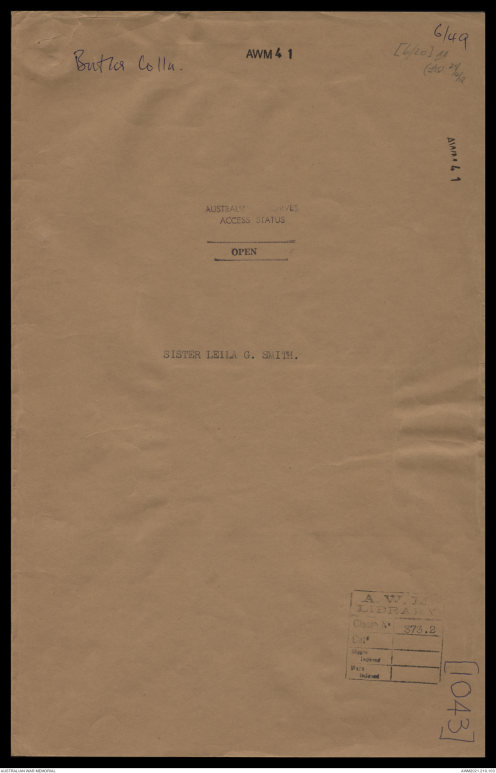
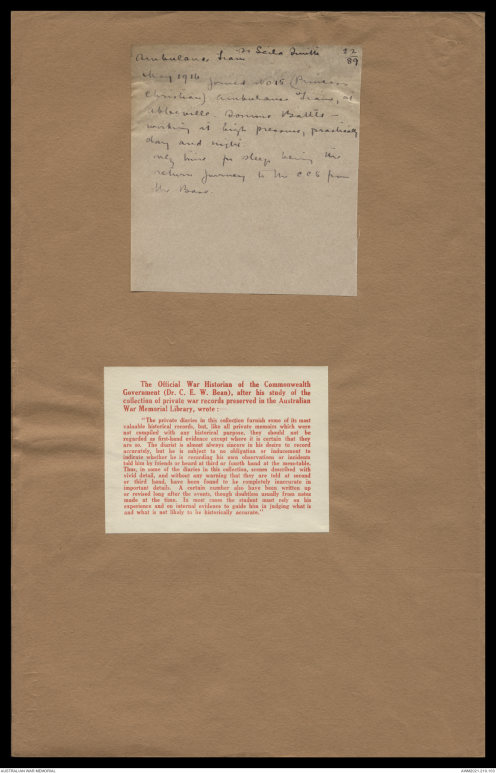
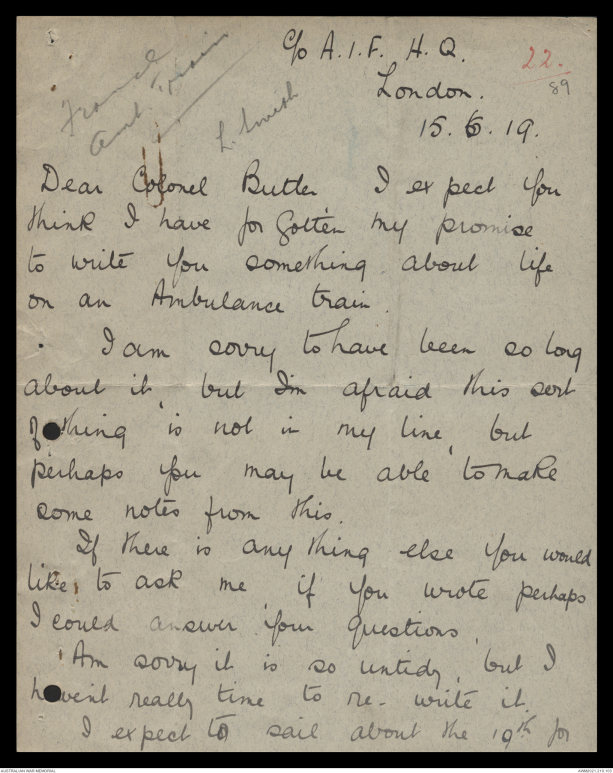
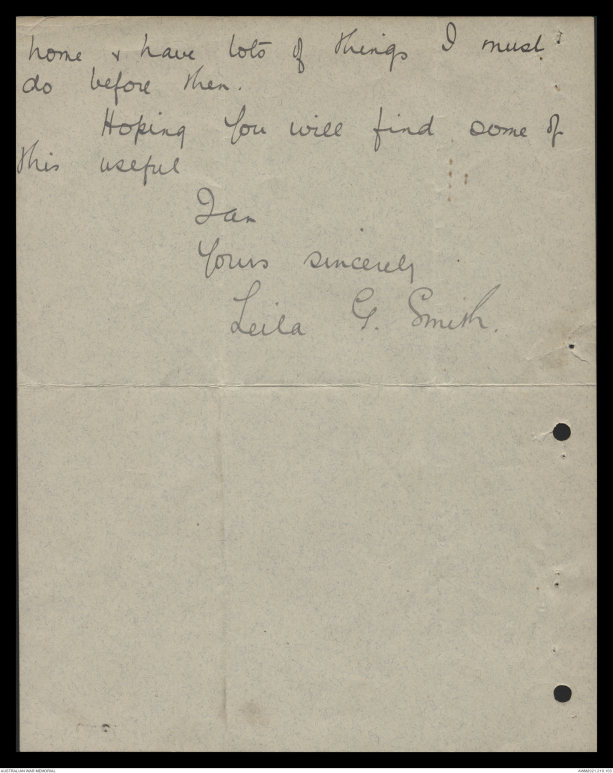
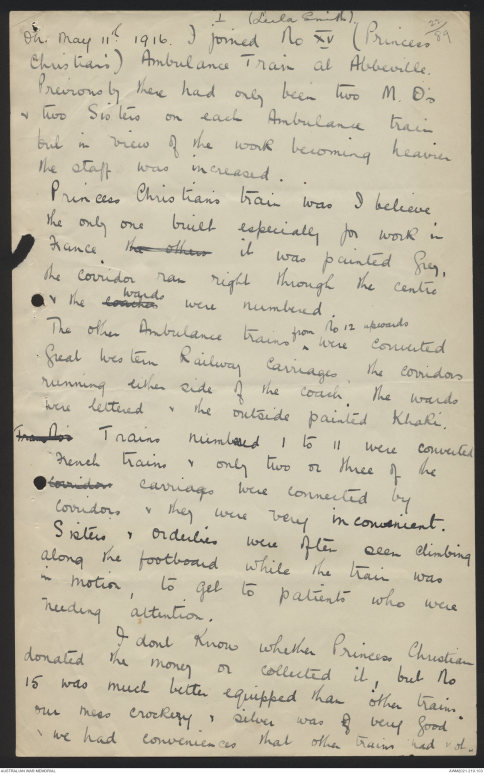
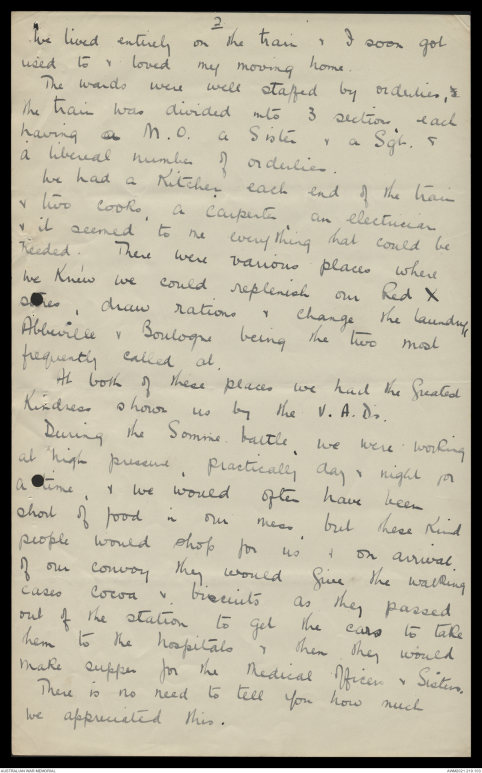
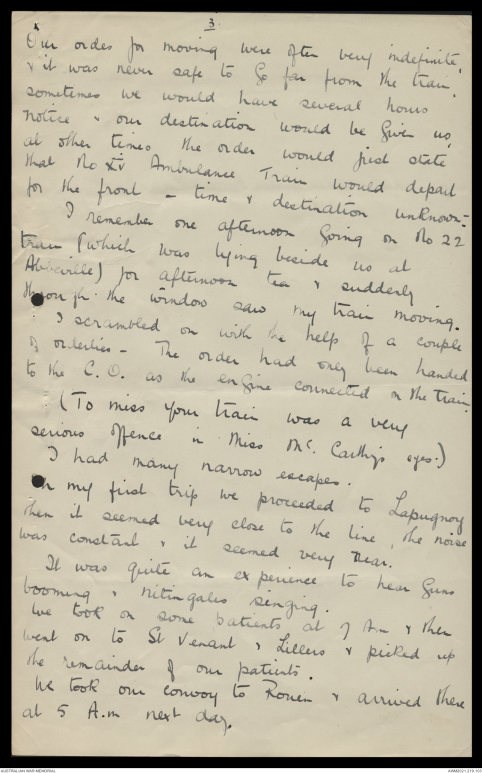
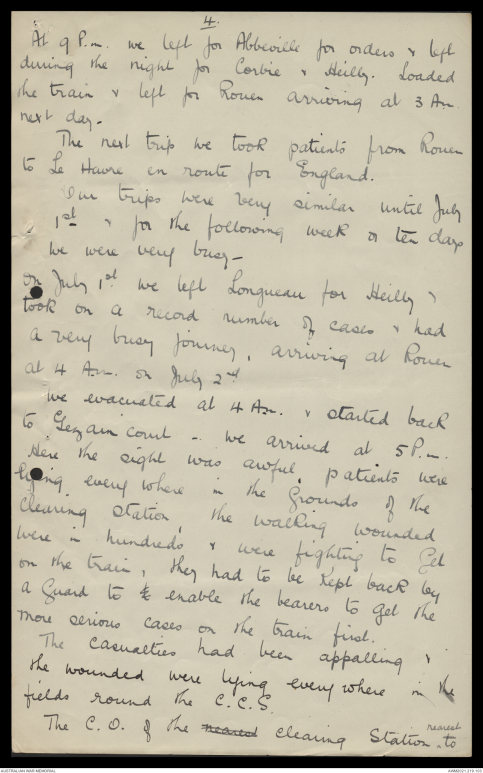
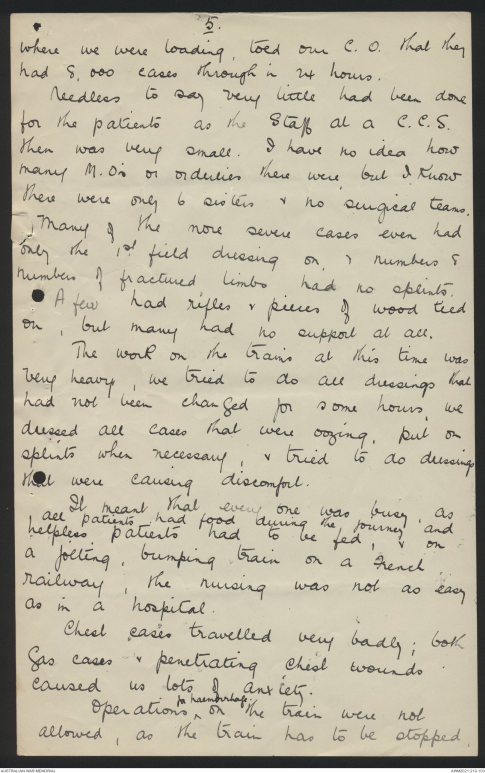
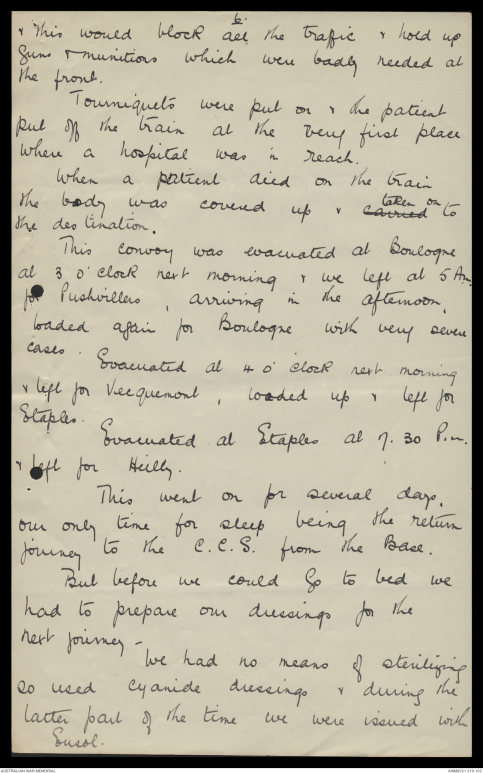
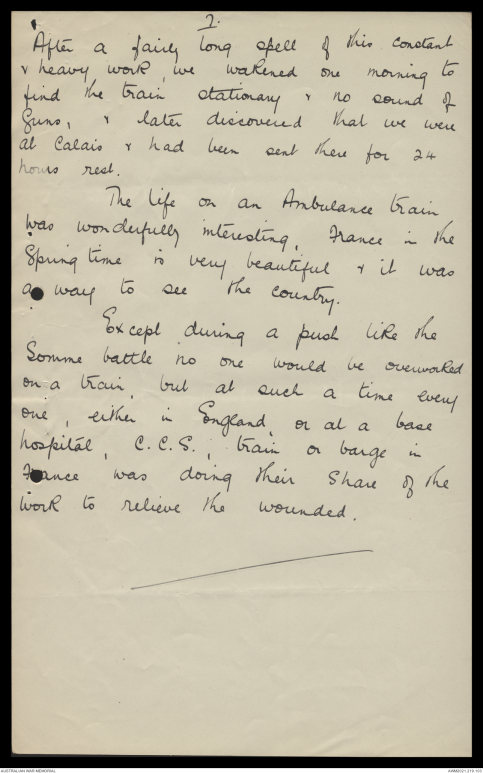
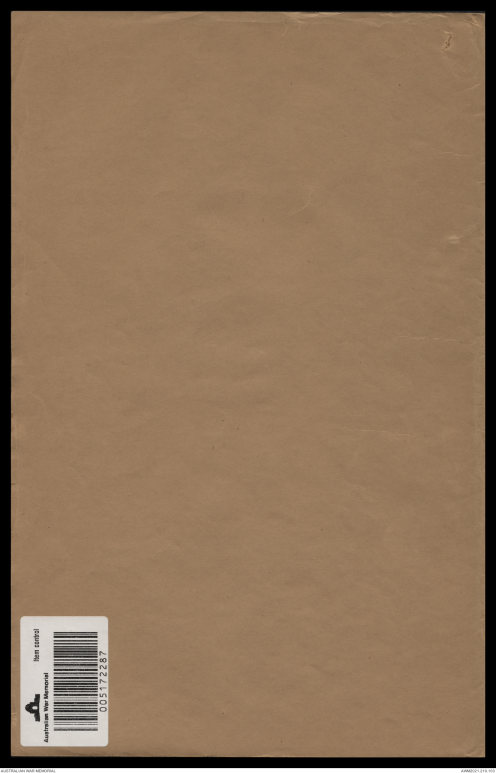
Butler Colln.
AWM 41
6/49
[6/20]
[[?]]
AMW 41
AUSTRALIAN ARCHIVES
ACCESS STATUS
OPEN
SISTER LEILA G. SMITH
A.W.M.
LIBRARY
Classn No 373.2
[1043]
12/89
Sr Leila Smith
Ambulance Train
May 1916
Joined No15 (Princess
Christian) Ambulance Train, at
Abbeville, Somme Battle -
working is high pressure, practically
day and night.
only time for sleep being the
return journey to the CCS from
the Base.
The Official War Historian of the Commonwealth
Government (Dr C. E. W. Bean), after his study of
the collection of private war records preserved in the Australian
War Memorial Library, wrote:
"The private diaries in this collection furnish some of its most
valuable historical records, but, like all private memoirs which were
not compiled with any historical purpose, they should not be
regarded as first-hand evidence except where it is certain that they
are so. The diarist is almost always sincere in his desire to record
accurately, but he is subject to no obligation or inducement to
indicate whether he is recording his own observations or incidents
told him by friends or heard at third or fourth hand at the mess-table.
Thus, in some of the diaries in this collection, scenes described with
vivid detail, and without any warning that they are told at second
or third hand, have been found to be completely inaccurate in
important details. A certain number also have been written up
or revised long after the events, though doubtless usually from notes
made at the time. In most cases the student must rely on his
experience and on internal evidence to guide him in judging what is
and what is not likely to be historically accurate".
French
Amb. Train
C/o A.I.F. H.Q.
London
15.6.19
22./89
L. Smith
Dear Colonel Butler, I expect you
think I have forgotten my promise
to write you something about life
on an Ambulance train.
I am sorry to have been so long
about it, but I'm afraid this sort
of thing is not in my line, but
perhaps you may be able to make
some notes from this.
If there is any thing else you would
like to ask me, if you wrote perhaps
I could answer your questions.
Am sorry it is so untidy, but I
haven't really time to re-write it.
I expect to sail about the 19th for
home & have lots of things I must
do before then.
Hoping you will find some of this useful
I am
Yours sincerely
Leila G. Smith.
1 (Leila Smith)
22/89
On May 11th 1916 I joined No XV (Princess
Christian's) Ambulance Train at Abbeville.
Previously there had only been two M.O's
& two Sisters on each Ambulance train
but in view of the work becoming heavier
the staff was increased.
Princess Christian's train was I believe
the only one built especially for work in
France the others it was painted grey,
the corridor ran right through the centre
& the coaches wards were numbered.
The other Ambulance trains ^from No 12 upwards were converted
Great Western Railway carriages, the corridors
running either side of the coach, the wards
were lettered & the outside painted khaki.Train Nos Trains numbered 1 to 11 were converted
French trains & only two or three of thecorridors carriages were connected by
corridors & they were very inconvenient.
Sisters & orderlies were often seen climbing
along the footboard while the train was
in motion, to get to patients who were
needing attention.
I dont know whether Princess Christian
donated the money or collected it, but No
15 was much better equipped than other trains.
Our mess crockery & silver was of very good
& we had conveniences that other trains had not.
2
We lived entirely on the train & I soon got
used to & loved my moving home.
The wards were well staffed by orderlies, &
the train was divided into 3 sections, each
having a M.O. a Sister & a Sgt. &
a liberal number of orderlies.
We had a kitchen each end of the train
& two cooks, a carpenter, an electrician
& it seemed to be everything that could be
needed. There were various places where
we knew we could replenish our Red X
stores, draw rations & change the laundry,
Abbeville & Boulogne being the two most
frequently called at.
At both of these places we had the Greatest
Kindness shown us by the V.A.D.s.
During the Somme battle, we were working
at high pressure, practically day & night for
a time, & we would often have been
short of food in our mess, but these kind
people would shop for us & on arrival
of our convoy they would give the walking
cases cocoa & biscuits as they passed
out of the station to get the cars to take
them to the hospitals & then they would
make supper for the Medical Officers & Sisters.
There is no need to tell you how much
we appreciated this.
3
Our order for moving were often very indefinite,
& it was never safe to go far from the train.
sometimes we would have several hours
notice & our destination would be given us,
at other times the order would just state
that No XV Ambulance Train would depart
for the front - time & destination unknown -.
I remember one afternoon going on No 22
train (which was lying beside us at
Abbeville) for afternoon tea & suddenly
through the window saw my train moving.
I scrambled on with the help of a couple
of orderlies - The order had only been handed
to the C.O. as the engine connected on the train.
(To miss your train was a very
serious offence in Miss McCarthy's eyes.)
I had many narrow escapes.
On my first trip we proceeded to Lapugnoy
then it seemed very close to the line, the noise
was constant & it seemed very near.
It was quite an experience to hear guns
booming & nitingales singing.
We took on some patients at 7 Am & then
went on to St Venant, Lillers & picked up
the remainder of our patients.
We took our convoy to Rouen & arrived there
at 5 A.m next day.
4
At 9 P.m. we left for Abbeville for orders & left
during the night for Corbie & Heilly. Loaded
the train & left for Rouen arriving at 3 Am
next day.
The next trip we took patients from Rouen
to Le Havre en route for England.
Our trips were very similar until July
1st & for the following week or ten days
we were very busy-
On July 1st we left Longueau for Heilly,
took on a record number of cases & had
a very busy journey, arriving at Rouen
at 4 A.m. on July 2nd
We evacuated at 4 A.m. & started back
to Gezaincourt - we arrived at 5 P.m.
Here the sight was awful, patients were
lying every where in the grounds of the
clearing station, the walking wounded
were in hundreds & were fighting to get
on the train, they had to be kept back by
a guard to l enable the bearers to get the
more serious cases on the train first.
The casualties had been appalling &
the wounded were lying every where in the
fields round the C.C.S.
The C.O. of the nearest clearing station ^nearest to
5
where we were loading, told one C.O. that they
had 8,000 cases through in 24 hours.
Needless to say very little had been done
for the patients as the Staff at a C.C.S.
then was very small. I have no idea how
many M.O's or orderlies there were, but I know
there were only 6 sisters & no surgical teams.
Many of the more severe cases even had
only the 1st field dressing on, & numbers &
numbers of fractured limbs had no splints.
A few had rifles & pieces of wood tied
on, but many had no support at all.
The work on the trains at this time was
very heavy, we tried to do all dressings that
had not been changed for some hours, we
dressed all cases that were oozing, put on
splints when necessary, & tried to do dressings
that were causing discomfort.
It meant that every one was busy, as
all patients had food during the journey and
helpless patients had to be fed, & on
a jolting, bumping train on a French
railway, the nursing was not as easy
as in a hospital.
Chest cases travelled very badly; both
gas cases & penetrating chest wounds
caused us lots of anxiety.
Operations ^ for haemorrhage on the train were not
allowed, as the train has to be stopped
6
& this would block all the traffic & hold up
guns & munitions which were badly needed at
the front.
Tourniquets were put on & the patient
put off the train at the very first place
where a hospital was in reach.
When a patient died on the train
the body was covered up & carried taken on to
the destination.
This convoy was evacuated at Boulogne
at 3 o'clock next morning & we left at 5 A.m.
for Pushvillers, arriving in the afternoon,
loaded again for Boulogne with very severe
cases.
Evacuated at 4 o'clock next morning
& left for Vecquemont, loaded up & left for
Etaples.
Evacuated at Etaples at 7.30 P.m.
& left for Heilly.
This went on for several days,
our only time for sleep being the return
journey to the C.C.S. from the Base.
But before we would Go to bed we
had to prepare our dressings for the
next journey.
We had no means of sterilizing
so used cyanide dressings & during the
latter part of the time we were issued with
Eusol.
7
After a fairly long spell of this constant
& heavy work, we wakened one morning to
find the train stationary & no sound of
guns, & later discovered that we were
at Calais & had been sent there for 24
hours rest.
The life on an Ambulance train
was wonderfully interesting, France in the
Spring time is very beautiful & it was
a way to see the country.
Except during a push like the
Somme battle no one would be overworked
on a train, but at such a time every
one, either in England, or at a base
hospital, C.C.S., train or barge in
France was doing their share of the
work to relieve the wounded.
[Australian War Memorial bar code 005172287]
 Sam scott
Sam scottThis transcription item is now locked to you for editing. To release the lock either Save your changes or Cancel.
This lock will be automatically released after 60 minutes of inactivity.